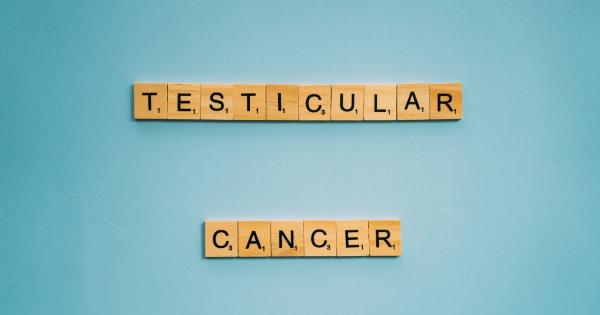Testicular cancer is a relatively rare form of cancer that develops in the testicles, which are part of the male reproductive system.
It is important to be aware of the signs and symptoms of testicular cancer, as early detection greatly improves the chances of successful treatment. In this article, we will discuss the various signs and symptoms that may indicate the presence of testicular cancer.
1. Lump or swelling in the testicle
A common symptom of testicular cancer is the presence of a lump or swelling in one or both testicles. The lump may be painless or may cause discomfort.
It is important to regularly check yourself for any abnormalities in the testicles and consult a healthcare professional if you notice any changes.
2. Pain or discomfort
Testicular cancer can also cause pain or discomfort in the testicles or scrotum. This pain may be persistent or intermittent and can range from mild to severe.
If you experience any unusual pain or discomfort in the testicular area, it is advisable to seek medical attention for further evaluation.
3. Heaviness or aching sensation
Some individuals with testicular cancer may experience a constant feeling of heaviness or an aching sensation in the affected testicle. This sensation may be accompanied by swelling or enlargement of the testicle.
If you notice any changes in the shape, size, or feeling of your testicles, it is essential to consult a healthcare professional promptly.
4. Changes in the texture of the testicle
Testicular cancer may cause changes in the texture of the testicle. The affected testicle may become hard or lumpy, and the skin may appear puckered or dimpled. Any changes in the texture of the testicle should be investigated by a medical professional.
5. Fluid accumulation in the scrotum
In some cases, testicular cancer may result in the accumulation of fluid in the scrotum, leading to swelling or a feeling of heaviness. This condition, known as a hydrocele, may cause discomfort and should be evaluated by a healthcare provider.
6. Back pain
In rare cases, testicular cancer can cause back pain. This occurs when the cancerous cells spread to the lymph nodes or other areas of the body, such as the spine.
If you experience persistent or unexplained back pain, it is important to consult a healthcare professional to determine the underlying cause.
7. Breast enlargement or tenderness
In certain types of testicular cancer, there may be hormonal changes that can lead to breast enlargement or tenderness in males. This occurs due to increased levels of estrogen.
If you notice any changes in your breast tissue, it is advisable to seek medical advice for further evaluation.
8. Fatigue and unexplained weight loss
Testicular cancer can sometimes cause general fatigue and unexplained weight loss. These symptoms may be indicative of advanced stages of the disease, where the cancer has spread to other parts of the body.
If you experience persistent fatigue or significant weight loss without any apparent cause, it is crucial to consult a healthcare professional for a thorough evaluation.
9. Abdominal pain or swelling
In advanced cases of testicular cancer, the cancerous cells can spread to the lymph nodes or organs in the abdomen, leading to abdominal pain or swelling.
If you have persistent abdominal pain or notice any unusual swelling, it is important to seek medical attention for a comprehensive examination.
10. Bone pain or fractures
In rare instances, testicular cancer can spread to the bones, leading to bone pain or even fractures. Bone pain usually occurs in more advanced stages of the disease.
If you experience persistent bone pain or fractures without any known cause, it is essential to consult a healthcare professional to determine the underlying reason.
Conclusion
Testicular cancer is a serious condition that requires prompt medical attention. Being aware of the signs and symptoms of testicular cancer is crucial for early detection and successful treatment.
If you experience any of the symptoms mentioned in this article or notice any changes in your testicles, it is important to consult a healthcare professional for proper diagnosis and appropriate management.




























